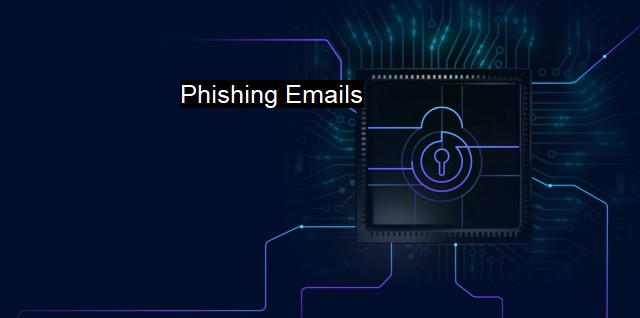What are Phishing Emails?
How Antivirus Software Can Protect You Against Phishing Scams: A Vital Defense Against Cyber Threats
Phishing emails are a form of cyberattack employed by hackers to infiltrate a network or steal sensitive information by deceiving a user into revealing critical data like passwords, bank account numbers, and even social security numbers. These emails usually appear as an authentic communication from legitimate entities like financial institutions, governmental departments, or well-known firms. It is a widespread and severe issue within the sphere of cybersecurity, and it's frequently discussed within the context of antivirus programs and their adequacy in handling such threats.Phishing often functions via the creation of a sense of urgency. A user may be notified of an account suspension asking for immediate action to restore it. The email would effectively use corporate images and logos to convince the user of its authenticity and may contain a direct link ('phishing link') leading to a fraudulent web site that mirrors the official site. Users are then tricked into entering their confidential account information, enabling the hacker to intercept it.
A more advanced form of phishing attack, known as spear phishing, targets specific individuals or companies, utilizing research to have access to specifics that could lead credibility to their attack. This includes using the names, positions, and direct email addresses of company executives.
To understand the risk of phishing, consider its effects on both an individual and organizational level. For individuals, they could face identity theft, substantial personal financial loss, stress, or long-term damage to their credit ratings. Companies having their systems violated could face more profound losses, including financial loss through unauthorized transactions, loss-of-reputation challenges leading to business decline, and legal implications if customer data is stolen.
Shockingly, although it's a method that's been in play since the mid-1990s, phishing is still a widespread technique used by cybercriminals today. It's effective because it capitalizes on human behavior and the desire not to be the root cause of a problem. To deal with phishing attacks, it is of utmost priority to ensure day-to-day email communication is safe and secure – this brings us to a discussion on the relevance and role of antivirus solutions.
While it's worth noting that phishing emails don't usually come embedded with viruses – their lethality lays in deception rather than deploying harmful software – a robust antivirus solution can identify and segregate phishing emails. First, some antivirus software uses machine-learning algorithms to identify phishing-specific customs or features, effectively "learning" how these fraudulent emails appear in order to recognize and quarantine future threats. they check links in emails to ensure they are from reputable or non-harmful sites, screening emails for malware and other cyber threats.
Phishing prevention can also utilize anti-spam solutions that block such emails before they reach users' inboxes. These systems are often optimally configured and updated frequently to keep up with evolving trends in phishing.
The effectiveness of an antivirus system in mitigating phishing is also ultimately tied to the user. Most experts urge individuals and employees in an organizational context to combine technical solutions with education and awareness about the dangers and signs of phishing attempts. When users are aware of suspicious practices - such as unusual sender email addresses, spelling errors, or requests for personal information - they are less likely to fall prey to such attempts. Thus, combining technical defense with vigilant behavior significantly reduces the potential damage from phishing emails.
Phishing emails are an old but effective trick that cybercriminals use to exploit unsuspecting victims. As part of an overall cybersecurity strategy, robust antivirus and anti-spam software are vital in the battle against these deceptive tactics. to supplement these technical solutions, user education and awareness are just as important in reducing victim vulnerability. The fight against phishing necessitates a holistic approach which necessitates both keen software intervention and human attention.

Phishing Emails FAQs
What is a phishing email?
A phishing email is a type of cyber attack where the attacker impersonates a legitimate organization or individual to trick the recipient into providing sensitive information such as login credentials, financial information, or personal details.How can I recognize a phishing email?
Phishing emails often use urgent or threatening language, contain suspicious links or attachments, and may ask you to verify or update your information. Look for spelling and grammar errors or a suspicious sender email address.What should I do if I receive a phishing email?
Do not click on any links or attachments and do not reply to the email. Instead, report the email to your IT department or to the legitimate organization that the attacker is impersonating. You can also delete the email and run a virus scan on your computer to ensure that it has not been infected.How can I protect myself from phishing emails?
Be cautious of any unexpected or suspicious emails, use antivirus software and firewalls, and keep your software and operating system up to date. You can also enable two-factor authentication for added security and never provide sensitive information via email or online forms.| | A | | | B | | | C | | | D | | | E | | | F | | | G | | | H | | | I | | | J | | | K | | | L | | | M | |
| | N | | | O | | | P | | | Q | | | R | | | S | | | T | | | U | | | V | | | W | | | X | | | Y | | | Z | |
| | 1 | | | 2 | | | 3 | | | 4 | | | 7 | | | 8 | | |||||||